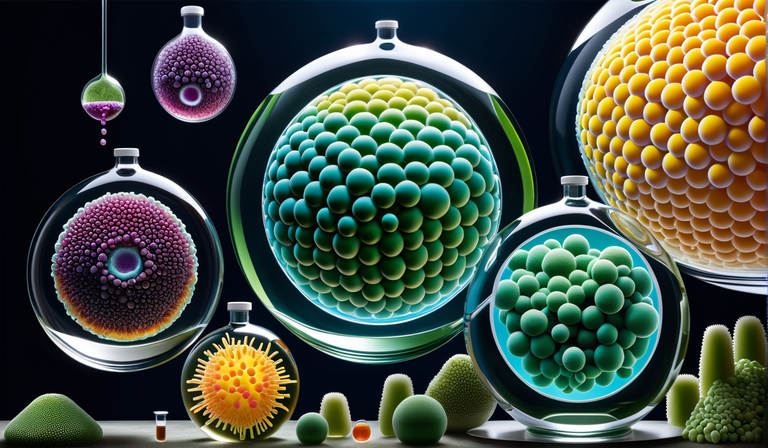Microbial fermentation, an age-old biotechnological process, is undergoing a remarkable transformation, catalyzed by advancements in science and an urgent need for sustainable solutions. This process, which utilizes microorganisms to convert organic substrates into valuable products, stands at the confluence of traditional knowledge and modern technological innovations, offering a promising path towards a more sustainable and efficient future…
The Scientific Foundations of Microbial Fermentation:
At its essence, microbial fermentation involves the enzymatic breakdown of organic materials by microorganisms under anaerobic conditions. This process is categorized into various types based on the end products and microorganisms involved:
- Alcoholic Fermentation: Yeasts convert sugars into ethanol and CO₂, fundamental to the production of beer and wine.
- Lactic Acid Fermentation: Bacteria transform sugars into lactic acid, crucial for dairy products and pickled vegetables.
- Acetic Acid Fermentation: Acetobacter species oxidize ethanol to acetic acid, used in vinegar production.
Advances in genetic and metabolic engineering have revolutionized our ability to enhance microbial strains, optimizing them for increased yields, product purity, and process efficiency. Techniques like CRISPR-Cas9 enable precise modifications to microbial DNA, tailoring microbes for specific fermentation tasks.
The Sustainable Edge of Microbial Fermentation
Microbial fermentation offers a compelling sustainable alternative to chemical synthesis, with several key advantages:

- Reduced Environmental Footprint: This biological process minimizes waste and pollution, contributing to cleaner production methods.
- Efficiency and Speed: Microbial fermentation can significantly shorten production cycles and enhance resource utilization.
- Diverse Product Range: The versatility of microbial fermentation supports the creation of a wide array of products, from pharmaceuticals to biofuels.
Leading Innovators in Microbial Fermentation
Prominent companies globally are leveraging microbial fermentation to drive innovation and sustainability:
Evonik (Germany) brings over three decades of experience to produce amino acids, biosurfactants, and complex proteins and enzymes through microbial fermentation.
Lonza (Switzerland) offers extensive expertise in microbial fermentation for biopharmaceuticals, demonstrating robust, scalable processes and an impressive ability to handle diverse microbial strains.
Avantium (Netherlands) and Global Bioenergies (France) are at the forefront of utilizing microbial fermentation to develop renewable materials and sustainable fuels, marking significant strides towards a greener economy.
Expanding Horizons: Agriculture +
Microbial fermentation is finding new applications in sectors like agriculture, where it aids in:
- Biofertilizers: Boosting soil fertility and plant health without the use of chemical fertilizers.
- Biopesticides: Providing safer alternatives for pest management.
- Growth Promoters: Enhancing crop resilience and yield through microbial action.
AI’s Impact on Fermentation! it’s happening fast………
Artificial Intelligence (AI) is set to revolutionize microbial fermentation, from optimizing strain selection and fermentation conditions to predicting product yields. Genome editing platforms and bioinformatics software stand out as critical tools, streamlining strain development and process optimization, thereby reducing development time and enhancing efficiency.
Key impacts include:
- Process Optimization: AI predicts optimal conditions for better yields.
- Strain Engineering: Enhances strains for higher productivity through AI predictions.
- Quality Control: Monitors and adjusts processes in real-time for consistent quality.
- Equipment Maintenance: Predicts failures to maintain continuous operation.
- Resource Efficiency: AI optimizes use of nutrients and energy, reducing waste.
The Future Landscape: Predictions for the Next 10-15 Years? ?????

The horizon for microbial fermentation is whatever you want. Take a look stranger! Things are changing in the following industries:
Personalized Medicine: Customized biologics and vaccines tailored to individual genetic profiles, made possible through advanced fermentation techniques.
Sustainable Materials: A significant increase in the production of bioplastics and biofuels, driving down our reliance on fossil fuels.
Nutritional Security: The development of novel food sources, addressing global food challenges with sustainable alternatives.
Environmental Restoration: Microbial solutions for carbon capture and soil rehabilitation, playing a critical role in combating climate change.
Blending the ancient art of microbial fermentation with the latest in science and sustainability is sparking a biotech evolution & revolution! This fusion, enhanced by AI and genetic engineering, charts a course for a future that’s not only sustainable but also rich in advancements for health, environment, and nutrition.

